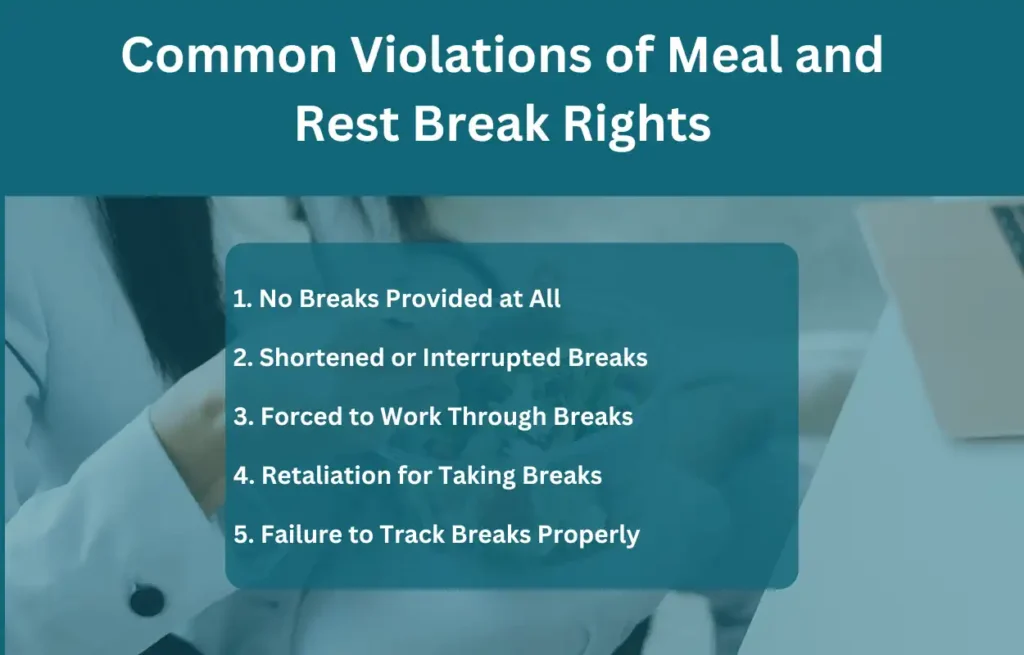Not every worker realizes it, but regular meal and rest breaks during the workday are not just a perk – they are a legal right under Oregon meal and rest break laws. Whether you are on your feet in retail, working long shifts in healthcare, or at a desk in an office, Oregon lunch break laws and Oregon rest break laws usually require your employer to give you time to step away from work.
Most non-exempt employees in Oregon are entitled to paid rest breaks and unpaid meal periods when they work long enough shifts. During a true meal period, your employer must relieve you of all work duties. If you are required to keep working, stay on call, or regularly have your break interrupted, that time generally needs to be paid.
This page explains how Oregon meal and rest break laws work, what your employer is required to provide, and what you can do if your employer is denying breaks, cutting them short, or punishing you for speaking up.
Important 2025 Update: The “Short Break” Penalty
A major Oregon court ruling (Pelican Brewing Co. v. Oregon) has clarified how meal breaks must work. If an employer provides a meal break that is even one minute short—for example, 29 minutes instead of the required 30—the employer may be required to pay the employee for the entire 30-minute period.
In Oregon, meal periods must be “continuous and uninterrupted.” If you are asked to start work even a moment early, or if your break is cut short for any reason, that time counts as hours worked and must be paid.
| Length of Shift | Paid Rest Breaks (10 min) | Unpaid Meal Breaks (30 min) |
| 2 hrs or less | 0 | 0 |
| 2 hrs 1 min – 5 hrs 59 min | 1 | 0 |
| 6 hrs | 1 | 1 |
| 6 hrs 1 min – 10 hrs | 2 | 1 |
| 10 hrs 1 min – 13 hrs 59 min | 3 | 1 |
| 14 hrs | 3 | 2 |
Also read:
5 Types of Discrimination in the Workplace
Overtime Laws in Oregon & How to Calculate Overtime Pay
What are the BOLI Rules for Oregon Meal and Rest Breaks?
Oregon’s labor laws offer some of the strongest break protections in the country. These regulations are enforced by the Oregon Bureau of Labor and Industries (BOLI) and apply to non-exempt employees (typically hourly workers, but also some salaried employees depending on classification).
Here’s what the law says:
Rest Breaks
- You are entitled to a paid 10-minute rest break for every 4 hours (or major portion thereof) worked.
- These breaks must be separate from your meal break.
- Breaks must be allowed in the middle of each work period, if feasible.
- Employers cannot require you to work through rest breaks or delay them excessively.
Meal Breaks
- You are entitled to an unpaid 30-minute meal break when working 6 hours or more.
- If you work 7 hours or more, your meal break should be taken between hours 2 and 5.
- If you are not relieved of all duties during a meal break (i.e., on-call or interrupted), the break must be paid.
Can I Waive My Lunch Break in Oregon?
In Oregon, the law usually says you cannot waive your lunch break. Even if you want to work through it to leave early, your employer is legally required to make sure you take that 30-minute unpaid break if you work 6 hours or more. If they let you skip it, the employer could get in trouble with BOLI.
Who Is Covered Under Oregon’s Meal and Break Laws?
Most Oregon employees are covered under these laws unless they meet exemption criteria under state or federal law. Typically:
- Hourly workers are non-exempt and fully protected.
- Some salaried workers, especially in administrative or professional roles, may be exempt.
- Even if you’re salaried, you may still qualify depending on your actual job duties.
If you’re unsure about your classification,reach out to our team for guidance misclassification is a common tactic used to avoid compliance.

Common Violations of Meal and Rest Break Rights
Employers don’t always follow the rules even when they know them. Here are some of the most common violations we see across Oregon:
1. No Breaks Provided at All
Some employers completely ignore the law, particularly in high-demand fields like food service, retail, or caregiving.
2. Shortened or Interrupted Breaks
Being told to take a “quick 5-minute” break instead of the full 10 minutes or being called back in during your lunch is illegal.
3. Forced to Work Through Breaks
You cannot be required to answer phones, serve customers, or complete tasks during a break. If you do, it must be paid.
4. Retaliation for Taking Breaks
Some employees face subtle pressure to “be a team player” by skipping breaks. Others are outright disciplined for insisting on their rights.
5. Failure to Track Breaks Properly
Oregon law requires accurate timekeeping. If breaks are not tracked or are falsified that may be a wage violation.
What to Do If Your Employer Isn’t Following the Law
Step 1: Keep Records
Track your schedule, the number of breaks you’re offered (or not), and any interruptions. Write down:
- Dates and times
- Who was involved
- Whether you were paid
- Any retaliation you faced
Step 2: Review Company Policy
Most employers are required to have written break policies under Oregon’s labor laws. Request a copy of your employee handbook and note any inconsistencies with what’s actually happening.
Step 3: Raise the Issue Internally
If it’s safe to do so, report the issue to your supervisor or HR in writing. Keep copies of emails or reports.
Step 4: File a Complaint with BOLI
You can file a wage claim with the Oregon Bureau of Labor and Industries if your employer is not complying. BOLI can investigate and help recover lost wages or penalties.
Step 5: Contact a Wage and Hour Attorney
Employers often push back on break claims—or retaliate when employees speak up. An experienced employment lawyer can protect your rights, file a claim, and seek damages on your behalf.

Can You Be Fired for Reporting Break Violations?
No, and if you are it’s illegal.
Oregon law prohibits retaliation for asserting your rights under labor law. This includes:
- Termination
- Demotion
- Schedule cuts
- Harassment or isolation
- Negative performance reviews
If you’re punished for standing up for your legal rights, you may also have a retaliation or wrongful termination claim.
What Are You Entitled to If Break Laws Are Violated?
If your employer fails to provide legally required breaks, you may be entitled to:
- Unpaid wages for time worked during breaks
- Penalty pay: One additional hour of pay per missed break in some cases
- Back pay for unpaid or underpaid work hours
- Emotional damages (if retaliation occurred)
- Attorney fees and court costs
At Meyer Employment Law, we help Oregon workers recover what they’re owed and hold employers accountable under wage and hour law.
Don’t Let Employers Take Advantage of Your Time
You work hard and you’re entitled to take care of yourself during the day. When an employer denies you basic rights like meal and rest breaks, it’s not just inconsiderate it’s illegal.
If you believe your Oregon employer is violating break laws, start documenting, speak up, and reach out for support. You may be entitled to back pay, penalties, and legal remedies that protect your time and dignity.
The team atMeyer Employment Law is here to help you navigate Oregon’s labor laws and make sure you’re treated fairly. Schedule your free consultation today to discuss your case in confidence.
Questions about Oregon meal and rest breaks?
If your employer is not giving you proper meal or rest breaks, making you work through your lunch, or changing your schedule when you speak up, you do not have to navigate this alone. Violations of Oregon lunch break laws and Oregon rest break laws can lead to unpaid wages, penalties, and sometimes retaliation or wrongful termination.
Meyer Employment Law is an Oregon employment law firm that represents employees only. We regularly help workers with wage and hour issues, including missed meal and rest breaks, off-the-clock work, and retaliation for asserting their rights.
Contact us today to talk with an Oregon wage and hour attorney about your situation and learn what options may be available to you.
FAQ: Oregon Meal and Rest Breaks
How many breaks do I get in an 8-hour shift in Oregon?
In most cases, an Oregon employer must provide at least two paid 10-minute rest breaks and one unpaid 30-minute meal period in an 8-hour shift. You must be fully relieved of all duties during the meal period.
Are lunch breaks paid in Oregon?
Meal periods are usually unpaid in Oregon, as long as you are fully relieved of all work duties. If you have to work through your meal, remain on call, or are regularly interrupted, that time generally must be paid.
Can I choose to skip my breaks in Oregon?
No. Meal and rest breaks are mandatory under Oregon law for most non-exempt employees. Even if you “volunteer” to skip them, your employer can still be liable if they do not make sure you actually take those breaks.
What if my employer only gives me a 5-minute rest break?
Oregon law requires a paid 10-minute rest break for every four hours or major portion of four hours worked. A 5-minute break usually does not meet that requirement, and your employer may owe you additional pay.
How long do I have to file a complaint about missed breaks in Oregon?
Deadlines can vary depending on whether you file a wage claim with BOLI or a lawsuit in court. Because time limits are strict, it is best to talk with an Oregon employment lawyer as soon as you realize your employer may be violating break laws. You can file a wage claim directly with BOLI (the Bureau of Labor and Industries) or talk to a lawyer.
Can I be fired for complaining about missed breaks?
No. Oregon law prohibits employers from retaliating against employees for reporting wage and hour violations, including missed meal or rest breaks. If you are demoted, written up, or fired after speaking up, you may have a separate retaliation or wrongful termination claim.



